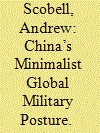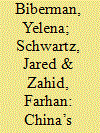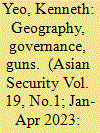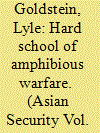|
|
|
Sort Order |
|
|
|
Items / Page
|
|
|
|
|
|
|
| Srl | Item |
| 1 |
ID:
189444


|
|
|
|
|
| Summary/Abstract |
What explains the mismatch between China’s vast economic presence, significant diplomatic engagement around the world, and its miniscule global military posture? China’s global defense footprint – as measured by overseas deployments and basing – is extremely modest compared to that of many other great powers. While military activity and the construction of military installations in the Asia-Pacific have both expanded noticeably in recent decades, China appears far more reticent to project or station armed forces beyond its immediate neighborhood. Domestic normative factors can explain Chinese hesitancy to increase its global military posture while geostrategic factors can explain the elevated regional activity and clustering of new bases around China’s periphery.
|
|
|
|
|
|
|
|
|
|
|
|
|
|
|
|
| 2 |
ID:
189446


|
|
|
|
|
| Summary/Abstract |
Over the past eight years, Beijing drastically furthered its interests with the China-Pakistan Economic Corridor (CPEC) while reducing terrorism threats from AfPak-based groups. All this despite the repression of Muslim minority Uyghurs in the Pakistan-bordering Xinjiang region. What has been China’s security strategy in Pakistan? What lessons are there for the United States? Drawing on fieldwork in China and Pakistan, as well as interviews with Chinese, Pakistani, and US officials, journalists, and local experts, this article shows that Beijing’s security strategy in Pakistan rests on four pillars: (1) military invisibility; (2) economic visibility; (3) indiscriminate diplomacy, and (4) geopolitical alignment. This is the opposite of what has been Washington’s approach, which can be characterized as militarily visible, economically invisible, diplomatically selective, and generally at odds with Pakistan’s regional interests.
|
|
|
|
|
|
|
|
|
|
|
|
|
|
|
|
| 3 |
ID:
189448


|
|
|
|
|
| Summary/Abstract |
Sanctuaries are strategic assets that are both the means and end objectives of terrorist groups. Groups with sanctuaries are often more devastating than groups without. Hence, it is critical to investigate the cause of persistent terrorist sanctuaries. The literature on terrorist sanctuaries identified history, geography, and governance as key factors contributing to the persistent terrorist sanctuaries. This article supplements existing arguments by contextualizing history, geography, and governance while discussing the role of terrorist capabilities. Hence, in the context of maritime Southeast Asia, the data suggest that the combination of the geographical features at the Sulu-Celebes Seas, the relationship between Terrorist-Territory-Tribe, and access to firearms significantly improves the group’s ability to hold territory.
|
|
|
|
|
|
|
|
|
|
|
|
|
|
|
|
| 4 |
ID:
189445


|
|
|
|
|
| Summary/Abstract |
Increasing tensions across the Taiwan Strait have prompted many strategists to debate the nature of China’s amphibious warfare capabilities. While it is often noted that Beijing’s armed forces lack major, recent experience in that domain, this research reveals that Chinese strategists have undertaken intensive and systematic investigation of foreign experiences, including with respect to the most classic cases, such as the Normandy invasion. This study represents a first attempt to survey such Chinese strategic writings, in an effort to better understand the lessons that Chinese strategists take from these foreign campaigns. Themes that emerge from this Chinese literature include an emphasis on undersea warfare capabilities as a critical enabler for amphibious invasion, but an even greater prominence for air supremacy. The most persistent theme in this Chinese literature surrounds intelligence preparation, deception and, above all, surprise. Such findings have important policy implications for Asian security.
|
|
|
|
|
|
|
|
|
|
|
|
|
|
|
|
| 5 |
ID:
189447


|
|
|
|
|
| Summary/Abstract |
Transnational jihadist organizations, such as the Islamic State, have sought to reinforce their reputations by establishing new global affiliates. Islamic State affiliates, in particular, have leveraged preexisting militant infrastructures in new locations to create strategic partnerships with some militant organizations, while delegitimizing and attacking others as rivals. In this context, we pose the following question: what factors explain whether local groups will cooperate with an emergent transnational affiliate, or engage in a rivalry? We present a theoretical framework, which depicts how state sponsorship of militant groups, and the persistent rivalry between Al-Qaeda and the Islamic State, can combine to influence new inter-group relationships. Applying our typology to the case of Islamic State Khorasan in the Afghanistan-Pakistan region, we demonstrate that the more adversarial a local militant group’s relationship with the Pakistani state, and the weaker its historical relational proximity to Al-Qaeda, the more likely the group is to cooperate with ISK.
|
|
|
|
|
|
|
|
|
|
|
|
|
|
|
|
|
|
|
|
|